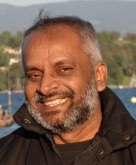Herman Kumara is a well-respected Sri Lankan human rights defender. Convenor of the National Fisheries Solidarity Movement, founder member of People to People Dialogue on Peace and Sustainable Development [PPD], an active member of Platform for Freedom [PfF], and a board member for the Women for Development Alternatives of Sri Lanka.
He has been active in many projects and has made an incredible contribution to Sri Lankan, as well as international, human rights campaigns.
This leading figure of the Sri Lankan civil society was accused wrongly of being the cause of protests by fishermen against fuel price increases of up to 50% as announced by the Government, in February 2012.
The demonstrations ended into violent clashes. Antony Warnakulasuriya, 35, was killed and several other were critically injured during the melee between the Police and the fishermen when the State forces indiscriminately opened fire with live bullets without any warning.
The Sri Lankan Government and the state media tried desperately to accuse NGOs of being responsible for this murder, saying that the protests were organized by anti-government forces. Addressing a cabinet press briefing on 23rd February, a group of Ministers described the recent protests against the fuel price increase as an “NGO funded conspiracy” supported by the West.
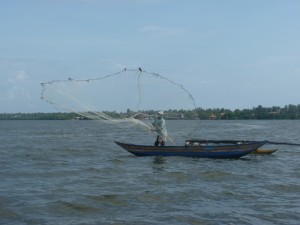 |
| Fisherman, Negombo Lagoon, South-West Sri Lanka. Copyright Chloe Dsbnt. |
The trigger for persecution of Herman Kumara was a statement the Fisheries Minister then made in Parliament:
“After the fisherman had reached an agreement, certain opportunists mobilized this protest. I will identify them by name. There is a man called Anura. The other person is Herman Kumara. ….. They are the real murderers.”
Since then, Herman Kumara has received repeated threats, surveillance and intimidation. Fearing to be murdered or abducted he has been obliged to live covertly for a while. During that time the Sri Lanka campaign interviewed him, and we include that interview at the end of the article.
Returning from an international conference in Rome at the end of February, Herman found out that he was being closely watched by the Government. He was being followed by suspicious cars, people in his village – as well as direct neighbours – had been questioned about him and asked his family’s details: including his address and his vehicle number. Meanwhile five of NAFSO’s employees were visited at their homes by intelligence officers and questioned about the Herman and the organization’s activities.
There was clearly a plan to abduct and/or murder him.
Mr Kumara’s wife and NAFSO filed official complaints about the threats and surveillance against him. However, no credible action appears to have been taken to investigate the threats or to provide him with adequate protection.
This case is far from being unique. Since the end of the war, arbitrary arrests and abductions have become common in Sri Lanka. 58 abductions have been registered in the last 6 months. Many of the victims were those who are not afraid to talk against Rajapaksa’s Government: journalist, human rights defender, and religious leaders -all of them now defined by the title of “anti-Government forces” or Traitors. People like Herman Kumara testify to the critical condition of the rule of law in Sri Lanka.
Do you want to help? Please Act by joining the Asian Human Rights Commissions Urgent Appeal by clicking here.
An interview with Herman Kumara:
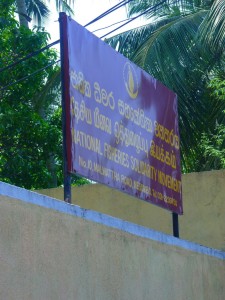 |
| NAFSO Office, Negombo, South-West Sri Lanka. Copyright Chloe Dsbnt. |
Herman, we now know a bit more about the hard situation you have been recently facing.
Were you officially accused of illegal acts by the governmental authorities?
No, I have never been accused of any illegal action; there have been no complaints to the police, or any case in the courts about me. I am doing my work within the framework of the democratic and political rights stipulated by the Sri Lankan constitution.
I have been an active member of civil society for the 20 years since 1992, I have never once received a complaint of illegal action from any government authority.
It was only the present Minister of Fisheries who accused me, claiming we are the responsible persons for the instigation of fishermen against the “incredible fuel price hike”. This was a spontaneous act of fishermen and no organization or trade union was involved.
Did you, regarding Sri Lankan law, commit any illegal acts that could be used to justify actions against you? Or lead to the threat of abduction?
No. There is no such illegal act committed by me or my organization.
Even if anyone else committed such an illegal act, the abduction or kidnap is not the way to respond it. There is a legal procedure. Sri Lanka is a so called democratic country. People respect the judicial system and still there are ways to take legal action for any crime. Extra judiciary acts cannot be justified at any cost.
There is a culture of silence prevailing for such acts. Majority people in the south justified the abductions, disappearances, intimidations, harassments during the war time. Now, the same system is being applied to people in the south and the cost is very high. So, southern people are learning lessons today as to what the Tamil ethnic minorities faced over the last three decades.
You got back to Sri Lanka at the end of April, do you still fear for your life or to be abducted?
I went back to Sri Lanka because I have my role to play as a human rights defender. There are thousands of such people struggling to ensure the rule of law, work against impunity, establish the right to freedom of expression, the rights of ethnic minorities, the unended cries of the internally displaced people, the problems faced by women headed families, and as a whole establish democratic rights of the country.
So, I wanted to join hands with them as one victim among thousands. However, the danger is not over. Once you were targeted, you will not be safe even though you were able to escape once or twice. So, I am taking all possible steps to be safe and to survive. But I will continue my engagements to make Sri Lanka a democratic and decent society.
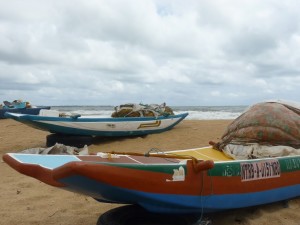 |
| Small fishing boats, Negombo Beach, South West Sri Lanka. Copyright Chloe Dsbnt. |
Can you explain a little bit how your life looks like in Sri Lanka? What are the kind of precautions you must take to feel as secure as possible?
I cannot explain all of my precautions as that would put me in further danger.
I work in a high profile a manner as possible and I take as many security measures as possible in my private life. That is the main strategy I have adopted
However, my main precautionary measure is working more with the communities and building up trust. Perpetrators want to discredit my work and my name using all possible ways. My biggest strength is the trust of the people whom I am working with.
Additionally my engagements with local, national and international social movements are my strength. They keep an eye on me and my engagements.
Recently, there was a spate – we called it an epidemic – of abductions. That now seems to have stopped. It is a false impression? Can you explain what are the reasons in your point of view?
There were three major incidents that exposed the government engagements in the abductions in recent past. One was the attempt to abduct the mayor of Kolonnawa urban council. The other one was the abduction and releasd of a provincial councillor who is a brother-in–law of a cabinet minister. The last one was the abduction of the leader of the Front-line Socialist Party and a political activist.
In the first event, the Kolonnawa mayor and his people were able to capture the perpetrators and hand them over to police. But police did not take any legal action against them; there was a report that the DIG (Deputy Inspector General of Police) for Colombo division attended to the case and took the perpetrators to freedom.
In the second incident, the provincial councillor was released some time after the abduction. Then he came to the media and innocently revealed how he was released with the intervention of his brother-in-law, the cabinet minister. Divaina , a Sinhala language newspaper, reported that the cabinet minister had phoned the president and his brother, the Secretary of the Defence ministry then got involved to release him from the abduction.
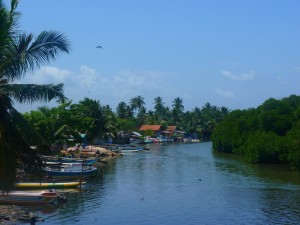 |
| Negombo Canal, South-West Sri Lanka. Copyright Chloe Dsbnt. |
The third incident was the release of the Frontline Socialist Party leader and the activist. With the involvement of the Australian high commissioner and the pressure from internal and external forces against the abduction, the perpetrators had to release both of them. It was somewhat long story but the involvement of the authorities was also exposed.
So, due to these very public embarrassments, the rate of abductions has drastically reduced during the few weeks since early April. However, there was another abduction reported within the last week. So, we cannot say the perpetrators are ready to give up their illegal operations just because they reduced their vigour for the time being.
In my opinion, there is another important factor. The implementation of the recommendations in the LLRC (Lessons Learned and Reconciliation Commission) report and the National Action Plan for Human Rights is one of the important issues in front of the government. Unless we implement the LLRC recommendations, we will have to face the consequences in March 2013 when the UN Human Rights Council will meet in Geneva. At the same time the Government of Sri Lanka (GoSL) has sent the foreign minister to the USA to explain how the GoSL is planning to implement the LLRC recommendations. The UN UPR (Universal Periodic Review) will be happening this autumn.
So, the government need to implement some of the actions in some of these plans or we will face serious embarrassment in front of the international community. So, all these are challenges to the Sri Lankan Government and they need to show [or at least pretend] how seriously they take measures to ensure rule of law and establish democracy in the SL society.
Herman, thank you very much, and the best of luck.
SLC
